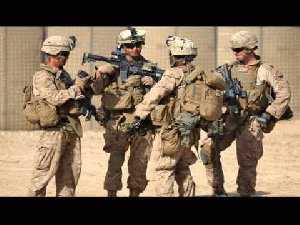Reprinted from WSWS
The commander of US forces in Afghanistan is prepared to ask the Obama administration to send more American troops to the country under conditions in which the security forces of the US-backed regime in Kabul have proven incapable of holding back a nationwide offensive by the Taliban.
In an interview published Tuesday by USA Today, Army Gen. John Campbell said that he would seek to postpone as long as possible any drawdown of the nearly 10,000 US troops now deployed in Afghanistan and would not hesitate to request additional forces should he find them necessary.
President Barack Obama last October reneged on his pledge to withdraw virtually all US troops from Afghanistan before the end of his administration, ordering instead a force of 9,800 to remain there through most of 2016, with at least 5,500 troops still in place when he leaves office in January 2017.
General Campbell indicated that he would resist any reduction in the size of the American occupation force. "My intent would be to keep as much as I could for as long as I could," he told the newspaper in a telephone interview from Kabul.
Campbell expressed confidence that if he pushed for an escalation of the US deployment in Afghanistan, the Obama White House would comply.
"My job as commander on the ground is to continually make assessments," the general told USA Today. "Every time I've gone to the president and said, 'I need X,' I've been very, very fortunate that he's provided that. So he's been very flexible. It's actually been conditions based as we've gone forward.
"If I don't believe that we can accomplish the train, advise and assist and the (counterterrorism) missions, then I owe it to the senior leadership to come back and say, 'Here's what I need.' If that's more people, it's more people."
The newspaper also cited Congressman Mac Thornberry of Texas, the Republican chairman of the House Armed Services Committee, who expressed support for increasing the number of US troops on the ground in Afghanistan. "The sheer lack of numbers as well as the restrictions our folks are put under handicap our efforts," he said.
Thornberry was quoted as saying that US military commanders had sought the deployment of up to 20,000 troops.
That the Pentagon, the Congress and the White House are once again embroiled in a debate over escalating the US intervention in Afghanistan speaks volumes about the debacle created by over 14 years of war and occupation that has cost more than $1 trillion, and seen more spent on aid than the entire expenditure under the Marshall Plan on the reconstruction of post-World War II Europe. Afghanistan, meanwhile, remains the most impoverished and undeveloped country in Asia.
The decision by the Obama White House in October to keep nearly 10,000 US troops in place was driven in large measure by the rout of Afghan security forces in the key northern city of Kunduz, which was overrun and held for nearly two weeks by the Taliban.
US forces were dispatched to play a leading role in retaking the city. In the course of the counterattack, a US AC-130 flying gunship carried out a sustained attack on the city's Doctors without Borders (MSF) hospital, killing 42 patients and medical staff members. MSF has demanded an independent investigation of the attack as a war crime.
The fall of Kunduz to the Taliban has been followed by its overrunning this month of virtually the entire Sangin district in southern Helmand province. The precarious situation confronting the US military was further underscored by a suicide bomber's killing of six American airmen patrolling the perimeter of Bagram air base on December 21.
A Pentagon report issued earlier this month found that "In the second half of 2015, the overall security situation in Afghanistan deteriorated, with an increase in effective insurgent attacks and higher A.N.D.S.F. [Afghan National Defense and Security Forces] and Taliban casualties."
The Afghan security forces, the report added, "remain in a primarily defensive posture that limits their agility across the country," while the "insurgents are improving their ability to find and exploit vulnerabilities, making the security situation still fragile in key areas and at risk of deterioration in other places."
(Note: You can view every article as one long page if you sign up as an Advocate Member, or higher).





